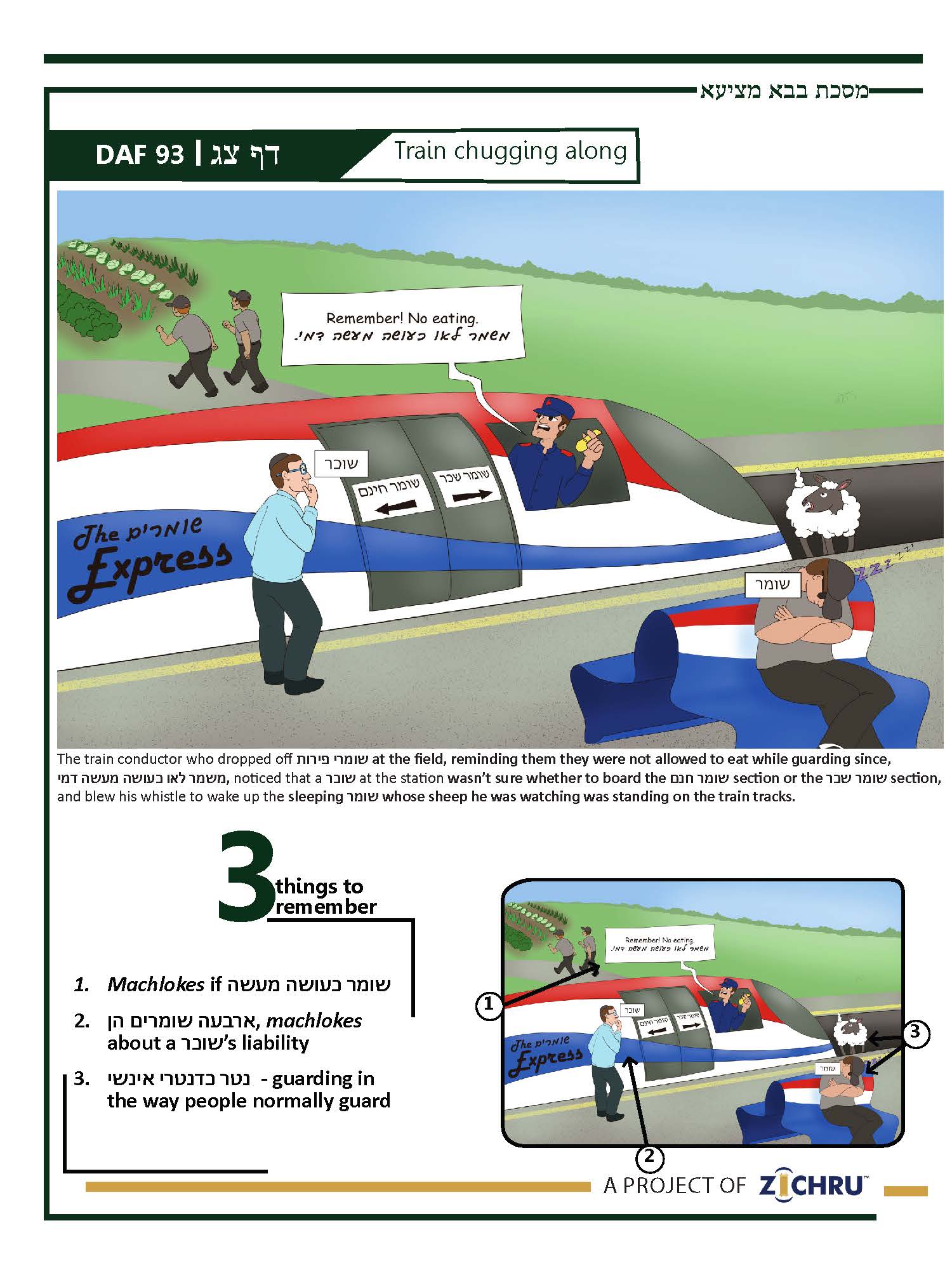Bava Metzia - Daf 93
- Audio Timestamps
0:00 - The 3 Sugyos
3:14 - Review of 3 Sugyos
6:07 - Siman
8:23 - 4 Blatt Back Chazarah
15:44 - Pop Quiz (Last 7 blatt)
For access to all Zichru resources including PDFs, and illustrations CLICK HERE
- Machlokes if שומר כעושה מעשה
The next Mishnah concludes: שומרי פירות אוכלין מהלכות מדינה אבל לא מן התורה – those who guard produce may eat from it based on common practice, but not Biblically. Rav says the Mishnah’s ruling pertains to שומרי גנות ופרדסין – those who guard gardens and orchards. Although he cannot eat from them Biblically, because they are attached and not being harvested, he may eat them based on minhag. However, שומרי גיתות וערימות – those who guard wine presses and piles of produce (before their maaser obligation) are Biblically entitled to eat, since the produce is detached. Rav holds: משמר כעושה מעשה דמי – guarding is like doing active work, and entitles him to a worker’s rights. Shmuel says that the Mishnah’s allowance to eat by minhag only applies to guarding detached produce (such as wine presses), but those guarding gardens and orchards do not eat at all, because he holds: משמר לאו כעושה מעשה דמי – guarding is not like doing active work. The Gemara proceeds to demonstrate that our Mishnah supports Shmuel’s opinion.
- ארבעה שומרים הן, machlokes about a שוכר’s liability
The next Mishnah states: ארבעה שומרים הן – there are four types of custodians: שומר חנם והשואל נושא שכר והשוכר – an unpaid custodian, a borrower, a paid custodian, and a renter. שומר חנם נשבע על הכל – A שומר חנם swears with regard to everything, meaning all types of loss described by the Torah for which other שומרים pay, and only pays for negligence. A שואל pays for every type of loss, including אונס. A שומר שכר and שוכר both swear על השבורה ועל השבויה ועל המתה – when claiming the animal broke a limb, was captured by armed robbers, or died naturally (all of which are unavoidable אונס), ומשלמין את האבידה ואת הגניבה - and pays for loss or theft, which are somewhat avoidable. Rav Nachman quoted Rabbah bar Avuha that this Tanna, who says a שוכר pays like a שומר שכר, is Rebbe Meir. The Gemara objects that a Baraisa teaches the very opposite, that Rebbe Meir considers a שוכר like a שומר חנם, and Rebbe Yehudah considers him like a שומר שכר. The Gemara answers that Rabba bar Avuha teaches an opposite version of this Baraisa. Since there are only three categories of payments, the Mishnah means: ארבעה שומרין ודיניהם שלשה – there are four types of שומרים, and their laws are three categories.
- נטר כדנטרי אינשי
A shepherd was once herding animals along the Pappa River, and one slipped and drowned. Rabbah exempted him, saying: מאי הוה ליה למיעבד – What should he have done to avoid this? הא נטר כדנטרי אינשי – He guarded them as people normally guard them, so the loss is considered an אונס. Rabbah would also exempt a shepherd who goes into the town when people normally do, leaving his animals alone outside, and even a shepherd who naps when people normally do. Abaye challenged him from a Baraisa describing an אונס as an attack by armed robbers, and Rabbah answers that it refers to חזני מתא – the town guards, upon whom the townspeople rely for protection, and are hired for a higher standard.
Later, the Gemara teaches that Rav Chisda and Rabbah bar Rav Huna disagree with Rabbah, because the owner can say: להכי יהבי לך אגרא – this is the reason I gave you pay; לנטורי לי נטירותא יתירתא – so you should guard for me a better guarding, and not follow common practice. Similarly, when Bar Adda was taking animals across a bridge, and one pushed another into the water, Rav Pappa held him responsible, because אבעי לך לעבורי חדא חדא – you should have crossed them one at a time, although this was not commonly done.
Siman – Train chugging along
The train conductor who dropped off שומרי פירות at the field, reminding them they were not allowed to eat while guarding since, משמר לאו כעושה מעשה דמי, noticed that a שוכר at the station wasn’t sure whether to board the שומר חנם section or the שומר שכר section, and blew his whistle to wake up the sleeping שומר whose sheep he was watching was standing on the train tracks.


